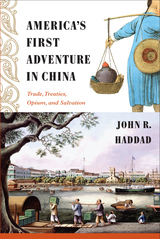
In America's First Adventure in China, John Haddad provides a colorful history of the evolving cultural exchange and interactions between these countries. He recounts how American expatriates adopted a pragmatic attitude-as well as an entrepreneurial spirit and improvisational approach-to their dealings with the Chinese. Haddad shows how opium played a potent role in the dreams of Americans who either smuggled it or opposed its importation, and he considers the missionary movement that compelled individuals to accept a hard life in an alien culture.
As a result of their efforts, Americans achieved a favorable outcome—they established a unique presence in China—and cultivated a relationship whose complexities continue to grow.
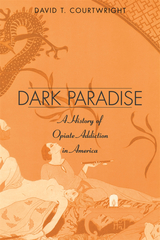
In a newly enlarged edition of this eye-opening book, David T. Courtwright offers an original interpretation of a puzzling chapter in American social and medical history: the dramatic change in the pattern of opiate addiction--from respectable upper-class matrons to lower-class urban males, often with a criminal record. Challenging the prevailing view that the shift resulted from harsh new laws, Courtwright shows that the crucial role was played by the medical rather than the legal profession.
Dark Paradise tells the story not only from the standpoint of legal and medical sources, but also from the perspective of addicts themselves. With the addition of a new introduction and two new chapters on heroin addiction and treatment since 1940, Courtwright has updated this compelling work of social history for the present crisis of the Drug War.
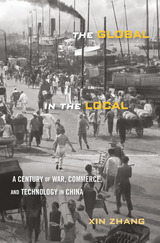
The story of globalization in the nineteenth and early twentieth centuries as experienced by ordinary people in the Chinese river town of Zhenjiang.
Fear swept Zhenjiang as British soldiers gathered outside the city walls in the summer of 1842. Already suspicious of foreigners, locals had also heard of the suffering the British inflicted two months earlier, in Zhapu. A wave of suicides and mercy killings ensued: rather than leave their families to the invaders, hundreds of women killed themselves and their children or died at the hands of male family members. British observers decried an “Asian culture” of ritual suicide. In reality, the event was sui generis—a tragic result of colliding local and global forces in nineteenth-century China.
Xin Zhang’s groundbreaking history examines the intense negotiations between local societies and global changes that created modern China. In the nineteenth and early twentieth centuries, world-historic political, economic, and technological developments transformed the textures of everyday life in places like Zhenjiang, a midsize river town in China’s prosperous Lower Yangzi region. Drawing on rare primary sources, including handwritten diaries and other personal writings, Zhang offers a ground-level view of globalization in the city. We see civilians coping with the traumatic international encounters of the Opium War; Zhenjiang brokers bankrolling Shanghai’s ascendance as a cosmopolitan commercial hub; and merchants shipping goods to market, for the first time, on steamships.
Far from passive recipients, the Chinese leveraged, resisted, and made change for themselves. Indeed, The Global in the Local argues that globalization is inevitably refracted through local particularities.

The British opium trade along China's seacoast has come to symbolize China's century-long descent into political and social chaos. In the standard historical narrative, opium is the primary medium through which China encountered the economic, social, and political institutions of the West. Opium, however, was not a Sino-British problem confined to southeastern China. It was, rather, an empire-wide crisis, and its spread among an ethnically diverse populace created regionally and culturally distinct problems of control for the Qing state.
This book examines the crisis from the perspective of Qing prohibition efforts. The author argues that opium prohibition, and not the opium wars, was genuinely imperial in scale and is hence much more representative of the actual drug problem faced by Qing administrators. The study of prohibition also permits a more comprehensive and accurate observation of the economics and criminology of opium. The Qing drug traffic involved the domestic production, distribution, and consumption of opium. A balanced examination of the opium market and state anti-drug policy in terms of prohibition reveals the importance of the empire's landlocked western frontier regions, which were the domestic production centers, in what has previously been considered an essentially coastal problem.
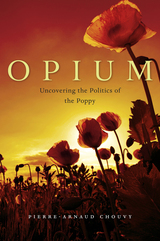
Known to the Greeks as opos or opion, as afiun in Persian and Arabic, and fuyung in Chinese, opium is at once a palliative and a poison. Its exotic origins, its literary associations, and the properties that are, often erroneously, attributed to it have ensured an ongoing air of mystery.
Pierre-Arnaud Chouvy reveals the long and fascinating history of a powerful and addictive drug and explores the changing fortunes of the modern-day illicit opium trade, especially in the remote regions of Asia. He answers key questions: Why have anti-drug policies failed despite four decades of increasing effort? And what are the shortcomings and limitations of forced eradication, alternative development, "silver bullets," and other quick fixes? In answering these questions, Chouvy draws upon geography, anthropology, politics, and development studies. He shows that the history of opium production is unexpectedly linked to the history of Afghanistan.
A compelling account of a narcotic as old as humanity, Opium offers powerful insights into the complex politics and economics of the poppy in the world today.
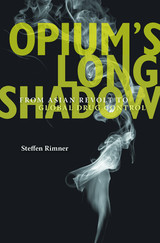
The League of Nations Advisory Committee on the Traffic in Opium and Other Dangerous Drugs, created in 1920, culminated almost eight decades of political turmoil over opium trafficking, which was by far the largest state-backed drug trade in the age of empire. Opponents of opium had long struggled to rein in the profitable drug. Opium’s Long Shadow shows how diverse local protests crossed imperial, national, and colonial boundaries to gain traction globally and harness public opinion as a moral deterrent in international politics after World War I.
Steffen Rimner traces the far-flung itineraries and trenchant arguments of reformers—significantly, feminists and journalists—who viewed opium addiction as a root cause of poverty, famine, “white slavery,” and moral degradation. These activists targeted the international reputation of drug-trading governments, first and foremost Great Britain, British India, and Japan, becoming pioneers of the global political tactic we today call naming and shaming. But rather than taking sole responsibility for their own behavior, states in turn appropriated anti-drug criticism to shame fellow sovereigns around the globe. Consequently, participation in drug control became a prerequisite for membership in the twentieth-century international community. Rimner relates how an aggressive embrace of anti-drug politics earned China and other Asian states new influence on the world stage.
The link between drug control and international legitimacy has endured. Amid fierce contemporary debate over the wisdom of narcotics policies, the 100-year-old moral consensus Rimner describes remains a backbone of the international order.

In 1908, a very public crusade against opium was in full swing throughout China, and the provincial capital and treaty port of Fuzhou was a central stage for the campaign. This, the most successful attempt undertaken by the Chinese state before 1949 to eliminate opium, came at a time when, according to many historians, China’s central state was virtually powerless. This volume attempts to reconcile that apparent contradiction.
The remarkable, albeit temporary, success of the anti-opium campaign between 1906 and 1920 is as yet largely unexplained. How these results were achieved, how that progress was squandered, and why China’s opium problem proved so tenacious are the questions that inspired this volume. The attack on this social problem was led by China’s central and provincial authorities, aided by reformist elites, and seemingly supported by most Chinese. The anti-opium movement relied on the control and oversight provided by a multilayered state bureaucracy, the activism and support of unofficial elite-led reform groups, the broad nationalistic and humanitarian appeal of the campaign, and the cooperation of the British government. The extent to which the Chinese state was able to control the pace and direction of the anti-opium campaign and the evolving nature of the political space in which elite reformers publicized and enforced that campaign are the guiding themes of this analysis.
READERS
Browse our collection.
PUBLISHERS
See BiblioVault's publisher services.
STUDENT SERVICES
Files for college accessibility offices.
UChicago Accessibility Resources
home | accessibility | search | about | contact us
BiblioVault ® 2001 - 2024
The University of Chicago Press









